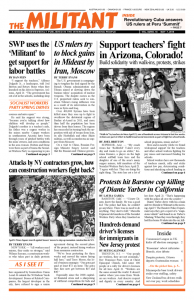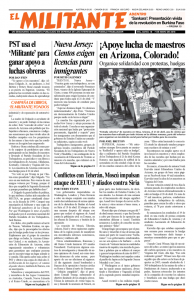TRENTON, N.J. — “Our people are workers, they are not criminals,” Rev. Francisco Pozo, vicar at Christ Episcopal Church, told some 400 people at a rally for driver’s licenses for all here April 21. “Workers are the same around the world. It doesn’t matter where you come from. Workers are workers. And deserve respect and dignity in every country. And they deserve a driver’s license to go to work.”
“We don’t say illegal here. We don’t say undocumented here,” Pozo said. “We say without U.S. documentation. Because no one is illegal on earth.”
The spirited march was organized by Cosecha-New Jersey and drew people from all over the state. Cosecha — Spanish for “harvest” — is a nationwide organization fighting for “permanent protection, dignity and respect for the 11 million” immigrants with papers the U.S. government doesn’t consider sufficient, its website says. The group has been organizing actions demanding licenses in cities and towns around New Jersey building for the march.
Construction and factory workers; immigrants from Mexico, Guatemala, Colombia, Nicaragua; local church groups; members of the Socialist Workers Party from New York and Philadelphia; and a contingent from the Trenton Education Association joined the march, which ended at the governor’s Statehouse.
SWP members carried signs supporting the fight for driver’s licenses and adding, “Amnesty for all immigrants now! No deportations! Organize the unorganized.”
Naomi Johnson-Lafleur, president of the Trenton Education Association, spoke at both the beginning and end of the march. “Fifty-four percent of our students are Latino,” she told the Militant at the rally. “Our parents should be able to drive their children to school. Now some of them walk 2 miles or more every day. They deserve the same rights as everybody else.”
Marchers chanted “Sin papeles, sin miedo” (Without papers, without fear) and “Licencias sí, promesas no” (Licenses yes, promises no). During the 2017 election campaign, Phil Murphy, who was elected governor, promised to protect “immigrants and dreamers,” including giving them access to driver’s licenses, but has done nothing since taking office in January.
A bill before the state legislature would allow workers without papers to get a special “limited” driver’s license that could be used to drive in the state, but not to board an airplane or enter a federal building. Many immigrant workers are reluctant to drive without a license, because they fear that if police stop them, they could be detained and handed over to federal immigration cops for deportation.
Like many of those on the march, this was the first time that 32-year-old construction worker Cándido Osorio had joined a protest. He came to the U.S. from México when he was 15 years old. “The moment has arrived to speak up,” he said. “We’re not doing this just for ourselves, this is for everyone, because everybody has a right to a decent job.”
After the election of Donald Trump as president, “there was a lot of uncertainty, but a lot of things are the same,” said Norma Castañaza, 25, who works for a shipping company. “Workers without papers get minimum wage or less. They don’t want to give us any benefits, we don’t get health insurance. If we’re doing the same work, we should get the same pay.”
“We cannot expect these people here to fight for us because they have other interests,” said Cosecha organizer Alejandro Jaramillo at the concluding rally, as he pointed to the governor’s Statehouse. “Their interests are the interests of the big corporations. Those are not our interests.
“That’s what happened with DACA,” he added, referring to temporary work permits and protection from deportation for youth known as “dreamers” first set up during the Barack Obama administration but never made into law. “The Democrats promised that they would fight to pass it. It’s just words from their mouths.
“We have to keep getting organized,” Jaramillo said. “With our labor power, our power in the streets.” They can be forced to act.
“This was my first time at a protest,” Yvonne González, a worker from Union City, said after the rally. “I felt free because I was demanding my rights.”
González is now planning to join the May Day protests for immigrant and workers’ rights in New York City. “I’m going to tell my relatives, my friends, don’t be afraid. Join in,” she said.

